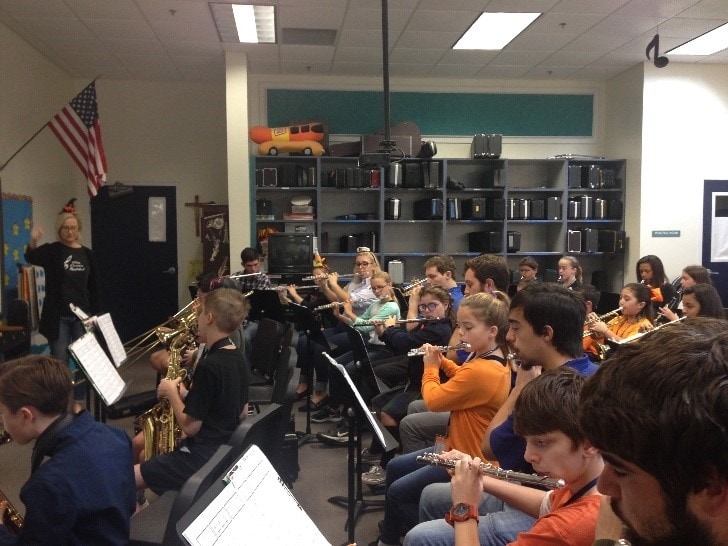/ News Posts / Educating in the Music Classroom through Service-Learning
Educating in the Music Classroom
through Service-Learning
By NAfME Member Jan Scott
Presented Educating in the Music Classroom through Service-Learning at the “NAfME is ME!” 2022 NAfME National Conference in National Harbor, Maryland.
Service-learning is an exciting hands-on approach to education that integrates community service with classroom instruction and will enrich the learning experience for everyone involved in the process. Not all students in the classroom will learn the same way. Exploring and implementing new ways to teach the content only enhances the learning environment. With the economy forcing administrators to place fewer and fewer teaching assistants in the classroom, this type of learning is beneficial to the students involved and the directors.
For 10 years, a service-learning partnership existed between my college classroom (a woodwind techniques course) and a local middle school beginning woodwind class, taught by Mickey Smith Jr. The following is the model that we have developed over our 10 years of collaboration. The service-learning process is comprised of four areas. Each area will be explained in detail.
1. Planning/Preparation
Planning begins by finding a partner for your collaboration. Prepare the Service-Learner (SL) and the beginner before the first classroom meeting.
2. Involvement/Participation
| The Service Objectives
§ Assistance for the director § Small group sessions § Mentors to beginning students § One-on-one instruction |
The Learning Objectives
§ Real lab experience § Small group experience § Collaboration § Gaining proficiency |
The service-learning model intends to benefit the provider (SL) and the recipient (beginner musician) of the service equally. The beginning student receives one-on-one mentoring, and the future music professional gains knowledge through a real lab experience.
3. Reflection
Build a musical toolbox with the ideas and methods observed in the classroom. The goal is to educate, engage, and encourage all participants. Mickey Smith Jr. always says, “Keep on going,” and you will “Find your sound.”
4. Recruitment/Display
Every middle school director must recruit for the next beginning band class. Allowing the SL to assist in this process offers many potential benefits:
 |
 |
 |
 |
The following quote from Ben Franklin is what we use as a guide for service-learning.
Tell me and I forget,
Teach me and I may remember,
INVOLVE me and I Learn…
About the author:
 NAfME member Jan Fillmore Scott is a Yamaha Performing Artist and has more than 40 years of teaching and performing experience, retiring in 2020 with more than 30 years in higher education. She taught applied woodwinds, and woodwind techniques/pedagogy, and developed a one-of-a-kind service-learning program during her tenure, receiving the Pinnacle Award for her innovative work. Jan’s new book, Beginning Woodwind Class: A Manual for College and Middle School Classrooms, is a culmination of her 10 years of collaboration and the development of the service-learning model. As a performer, she is a founding member of PASTICHE CHAMBER ENSEMBLE. She has recorded with Innova and Centaur Labels, and her performances have been heard on NPR, allowing audiences to hear the clarinet in a new and exciting medium. Learn more about Jan Scott, visit her website, and email her at Jansctt33@gmail.com.
NAfME member Jan Fillmore Scott is a Yamaha Performing Artist and has more than 40 years of teaching and performing experience, retiring in 2020 with more than 30 years in higher education. She taught applied woodwinds, and woodwind techniques/pedagogy, and developed a one-of-a-kind service-learning program during her tenure, receiving the Pinnacle Award for her innovative work. Jan’s new book, Beginning Woodwind Class: A Manual for College and Middle School Classrooms, is a culmination of her 10 years of collaboration and the development of the service-learning model. As a performer, she is a founding member of PASTICHE CHAMBER ENSEMBLE. She has recorded with Innova and Centaur Labels, and her performances have been heard on NPR, allowing audiences to hear the clarinet in a new and exciting medium. Learn more about Jan Scott, visit her website, and email her at Jansctt33@gmail.com.
Did this blog spur new ideas for your music program? Share them on Amplify! Interested in reprinting this article? Please review the reprint guidelines.
The National Association for Music Education (NAfME) provides a number of forums for the sharing of information and opinion, including blogs and postings on our website, articles and columns in our magazines and journals, and postings to our Amplify member portal. Unless specifically noted, the views expressed in these media do not necessarily represent the policy or views of the Association, its officers, or its employees.
Published Date
September 28, 2022
Category
- Careers
- Preparation
- Recruitment
Copyright
September 28, 2022. © National Association for Music Education (NAfME.org)




